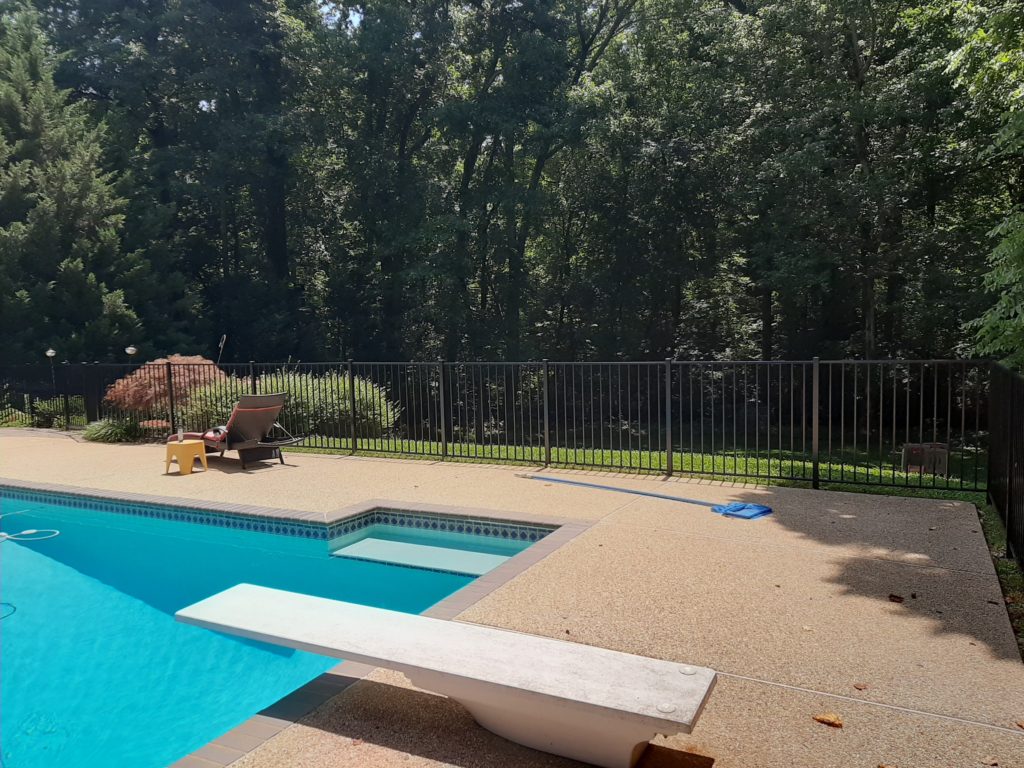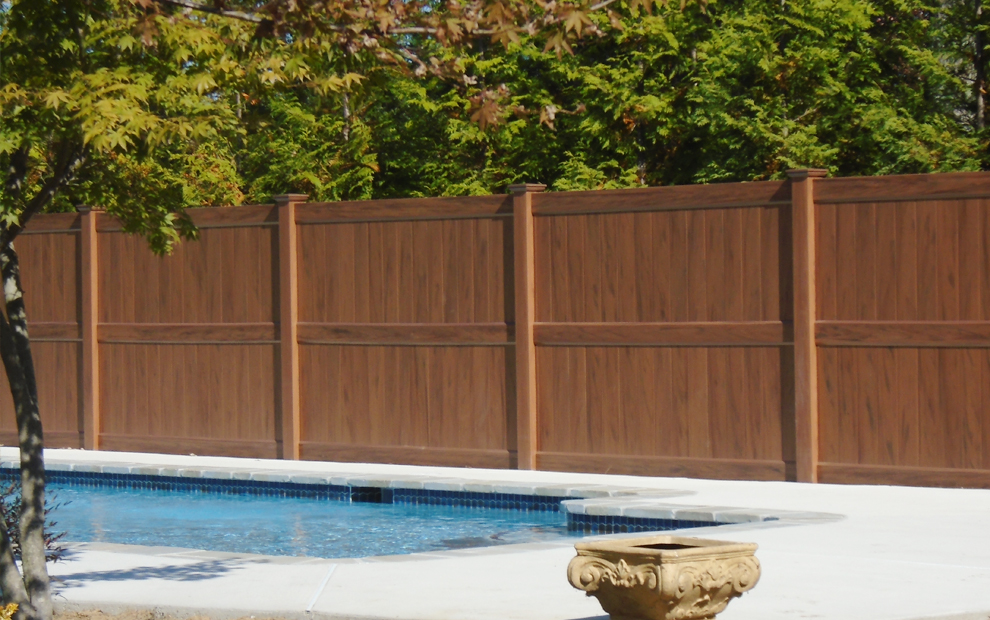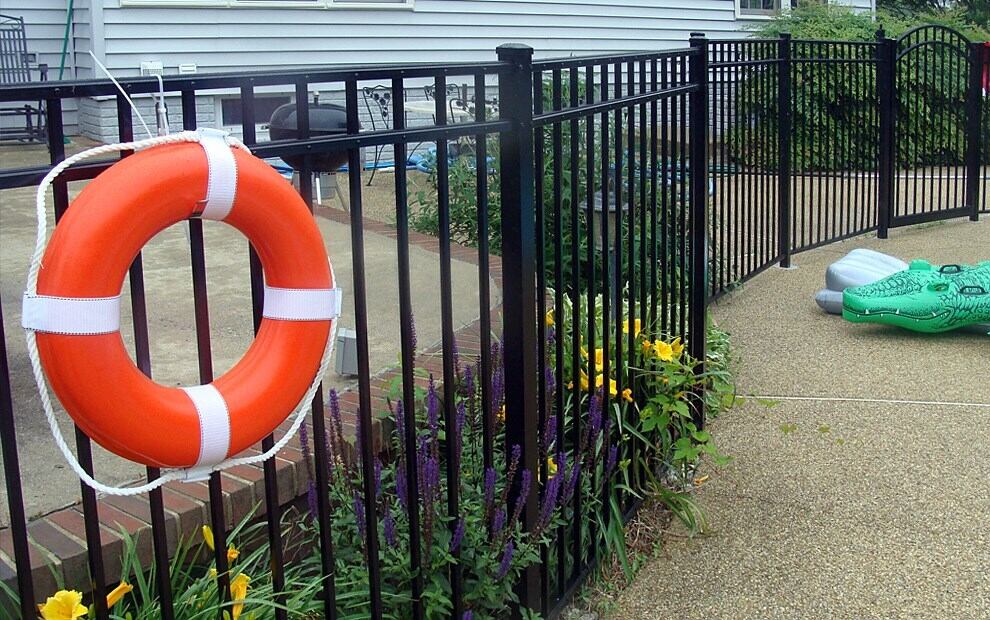When that first really hot day of summer arrives in Maryland, you might be thinking, “this is it. It’s time to finally invest in a pool.” While the luxury of a backyard swimming hole is tempting, there are many things you should keep in mind before taking the plunge, such as regular maintenance, the cost of installation and materials, and the likely increase of your homeowner’s insurance. Also on the pool owner’s responsibility checklist — properly securing the pool area to prevent accidents.
Swimming pool fencing and barrier guidelines were developed by the U.S. Consumer Product Safety Commission to keep young children safe and prevent them from accessing the pool without supervision . A child should not be able to climb over, crawl under, or pass through the barrier without the assistance of an adult. This is done by minimizing gaps or possible climbing handles in the fence, as well as ensuring the gate is effective. The basic guidelines for pool code are related to the height, scalability, and gate access. The BOCA National Building Code contains a set of guidelines when building barriers and fencing around a swimming pool. These are only guidelines, but your local government has law-binding codes that likely reflect these guidelines very closely. BOCA building codes should act only as a supplement to your local building codes. he most up-to-date requirements are available online via your county government’s website.

While safety and durability is obviously the main priority, your pool fencing should also be a reflection of your lifestyle, custom tailored to complement your home’s architecture, pool, and backyard. With varying county codes & permitting, styles and colors, a trusted fence installation company can help simplify the process in selecting the best pool fence option for you and your family. Pool fences are exposed to water, pool chemicals, sun, and all kinds of weather, which is why you need to choose a fence that can withstand the elements. Your pool fence needs to be made with fencing material that is durable, strong, and easy to clean. Below, you’ll find a few different material options to consider when enclosing your backyard pool.
Wood Pool Code Fencing

Wood fencing offers a rustic, yet classic charm and comes in a few different styles. You can provide security and privacy with 6’ panel heights, or a more open, rustic look with ranch-rail and wire mesh. While wood fencing is affordable and timeless, it also regulars upkeep and maintenance. Since wood and water don’t mix, you’ll need to seal and stain your fence on a regular basis to protect it from the elements. If you’re not willing to put in the extra work, wood fencing may not be the best choice for you.
In addition to which, you’ll need to clean, polish, and seal it on a regular basis to keep it looking its best. In addition, wood is susceptible to rotting, warping, and insect damage. Failure to properly maintain your wood fence could result in costly repairs down the road.
Aluminum Pool Code Fencing

Wrought iron or aluminum fencing is a beautiful fencing material that can raise curb appeal and provide a long-lasting safety barrier. Ornamental swimming pool fences will give the entire property an elegant feel. A well-crafted aluminum may even increase the value of your property, and their high durability prevents trespassing and increases safety. Its rust-resistant properties also make it a good choice for waterfront homes as well. While they are easy to clean and incredibly durable, one thing to consider, is that aluminum fencing is not as private as other fencing options, due to the spacing between pickets.
Vinyl Pool Code Fencing

Vinyl pool fences are durable, easy to clean and offer a huge range of styles to choose from. While a properly installed and well maintained wood fence can last you upwards of 15 years, wood as a material is subject to breakdown by the elements and will eventually need some type of repair or resealing. Vinyl, on the other hand, is a very durable material, especially if it’s from a reputable company using materials of a proper thickness. A vinyl fence typically lasts between 20 and 30 years. Vinyl fencing is also very affordable, making them a popular choice for most homeowners. Vinyl fencing is low maintenance, five times stronger than wood, and won’t decompose, rust, blister, rot, or peel.
No matter what you choose, it’s wise to have a secondary barrier even if you have a privacy fence, especially if you have pets or small children. The more precautions you can take to protect your family, the better off you will be!

